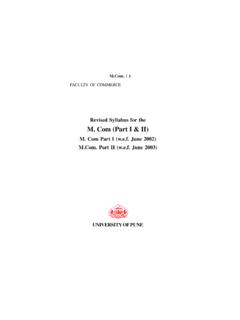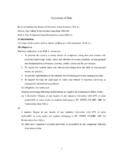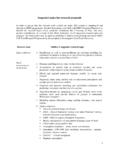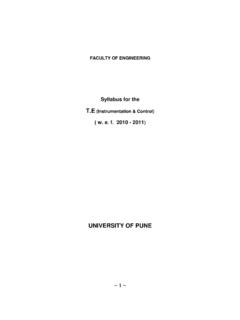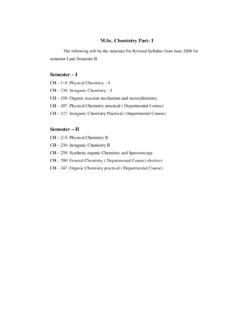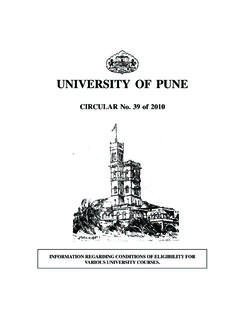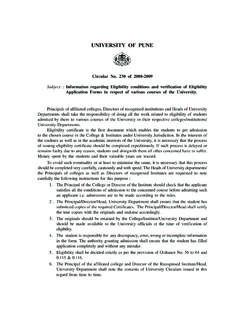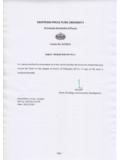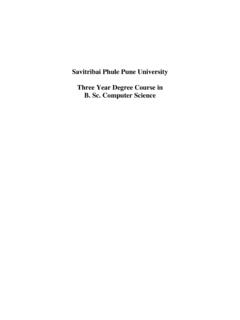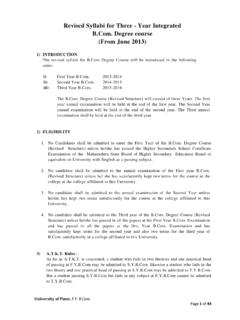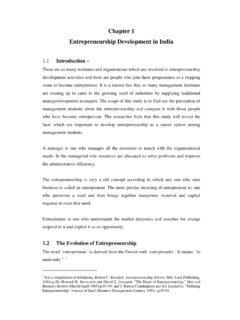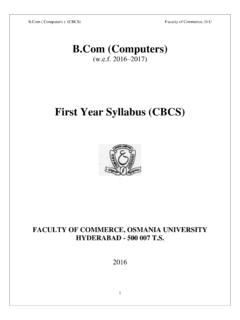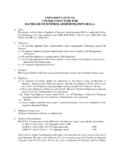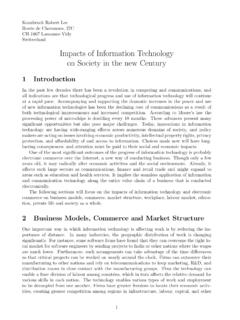Transcription of University of Pune
1 University of pune Revised Structure & Syllabi for Three Year Degree Programme of Bachelor of Computer Applications ( ) 1. The title of the programme will be Bachelor of Computer Application ( ) under Commerce Faculty . The revised program will be introduced for - a) from the academic year 2008-09 b) from the academic year 2009-10 c) from the academic year 2010-11 2. Objectives : The objectives of the Programme shall be to provide sound academic base from which an advanced career in Computer Application can be developed.
2 Conceptual grounding in computer usage as well as its practical business application will be provided. 3. Eligibility for admission : In order to be eligible for admission to Bachelor of Computer Applications a candidate must have passed a. HSC (10+2) from any stream with English as passing Subject with minimum 45% marks in aggregate. b. Two years Diploma in Pharmacy Course of Board of Technical Education, conducted by Government of Maharashtra or its equivalent. c. Three Year Diploma Course (after 10th Standard), of Board of Technical Education conducted by Government of Maharashtra or its equivalent. d.
3 MCVC e. Every eligible candidate has to pass Common Entrance Test to be conducted by the respective Institute/College. 4. Duration : The duration of the Degree Program shall be three years divided into six semesters. 5. The scheme of Examinations : The BCA Examination will be of 3600 marks as given Below I) a) (Sem I + Sem II ) : 1200 marks b) (Sem III + Sem IV ) : 1200 marks c) (Sem V + Sem VI ) : 1200 marks II) For Theory Paper There Will Be 80:20 Pattern 80 Marks : University Exam 20 Marks : Internal Exam For Practical And Project Examination Sem I to VI : 100 marks Sem I , III , V : External Assessment Sem II , IV ,VI : External Assessment 6.
4 The Standard of Passing and Award of Class In order to pass in the examination the candidate has to obtain 40 marks out of 100. (Min 32 marks must be obtained in University Examination . The class will be awarded on the basis of aggregate marks obtained by the candidate for all three years examinations . The award of class will be as follows : Aggregate Percentage of Marks Class (i) Aggregate 70% and above .. First Class with Distinction. (ii) Aggregate 60% and above but less than 70% .. First Class (iii) Aggregate 55% and more but less than 60% .. Higher Second Class (iv) Aggregate 50% and more but less than 55%.)
5 Second Class. (v) Aggregate 40% and more but less than 50% .. Pass Class. (vi) Below 40% .. Fail. 7. RULES OF a) A student shall be allowed to keep term for the Second Year, if he/she has a backlog of not more than three theory & one practical or four theory heads of total number of subjects of the First year examination, which consist of First & Second Semester. b) A student shall be allowed to keep term for the Third year, if he/she has no backlog of first Year & if he/she has a backlog of not more than three theory & one practical or four theory heads of total number of subject of the Second Year examination which consist of Third & Fourth Semester.
6 8. The Medium of Instruction and Examination (Written and Viva ) shall be English. 9. The Semester wise Structure of the programme shall be as follows : Semester I Course No. Newly Proposed Subject 101 Business Communication 102 Principles of Management 103 Programming Principles and Algorithms 104 Computer Fundamental and Office Automation 105 Business Accounting 106 Computer Laboratory and Practical Work (OA+PPA) Semester II Course No. Newly Proposed Subject 201 Organizational Behavior 202 Elements of Statistics 203 C Programming 204 File Structure and Database Concepts 205 Cost Accounting 206 Computer Laboratory and Practical Work ( + DBMS) Semester III Course No.
7 Newly Proposed Subject 301 Numerical Methods 302 Data Structure using C 303 Software Engineering 304 Management Accounting 305 RDBMS 306 Computer Laboratory and Practical Work ( + RDBMS) Semester IV Course No. Newly Proposed Subject 401 Networking 402 Visual Basic 403 Inventory Management (SAD) 404 Human Resource Management 405 Object Oriented Programming using C++ 406 Computer Laboratory and Practical Work ( VB + C++ ) Semester V Course No. Newly Proposed Subject 501 .NET Frameworks 502 Internet Programming and Cyber Law 503 Principals of Marketing 504 Core Java 505 Project work ( VB ) 506 Computer Laboratory and Practical Work (.)
8 NET + Core Java ) Semester VI Course No. Newly Proposed Subject 601 E-Commerce 602 Multimedia Systems 603 Introduction to SysPro And Operating Systems 604 Advance Java 605 Project Work ( Banking & Finance , Cost Analysis , Financial Analysis ,Payroll , EDP ,ERP etc.) 606 Computer Laboratory and Practical Work (Multimedia + Advanced Java) Syllabus Semester I Business Communication Course Code: 101 Objectives: 1) To understand the concept, process and importance of communication. 2) To gain knowledge of media of communication. 3) To develop skills of effective communication - both written and oral. 4) To make students familiar with information technology.
9 No. of Lectures Unit 1: Introduction to Communication Meaning and Definition - Process - Functions - Objectives - Importance - Essentials of good communication - Communication barriers - Overcoming communication barriers 12 Unit 2: Types of Communication Written - Oral - Face-to-face - Silence - Merits and limitations of each type 12 Unit 3: Business Letters Need and functions of business letters - Planning & layout of business letter - Kinds of business letters - Essentials of effective correspondence - 05 Unit 4: Drafting of business letters Enquiries and replies - Placing and fulfilling orders - Complaints and follow-up - Sales letters - Circular letters - Application for employment and resume 12 Unit 5.
10 Oral Communication Meaning, nature and scope - Principles of effective oral communication - Techniques of effective speech - Media of oral communication (Face-to-face conversation - Teleconferences - Press Conference - Demonstration - Radio Recording - Dictaphone - Meetings - Rumour - Demonstration and Dramatisation - Public address system - Grapevine - Group Discussion - Oral report - Closed circuit TV). The art of listening - Principles of good listening. 08 Unit 6: Information Technology for Communication Word Processor - Telex - Facsimile(Fax) - E-mail - Voice mail - Internet Multimedia - Teleconferencing - Mobile Phone Conversation - Video Conferencing - SMS - Telephone Answering Machine - Advantages and limitations of these types.
